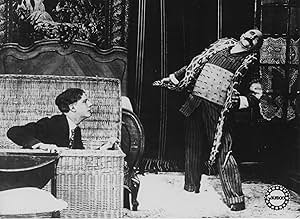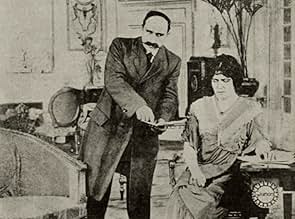Fantómas a la sombra de la guillotina
Título original: Fantômas I: À l'ombre de la guillotine
PUNTUACIÓN EN IMDb
6,9/10
2,7 mil
TU PUNTUACIÓN
Fantomas quiere ser conocido como el emperador del crimen. En primer lugar roba en el hotel Palace Royal. Luego, secuestra al Señor Beltham. La fama de Fantomas comienza a aumentar, hasta co... Leer todoFantomas quiere ser conocido como el emperador del crimen. En primer lugar roba en el hotel Palace Royal. Luego, secuestra al Señor Beltham. La fama de Fantomas comienza a aumentar, hasta convertirse en el enemigo público número uno.Fantomas quiere ser conocido como el emperador del crimen. En primer lugar roba en el hotel Palace Royal. Luego, secuestra al Señor Beltham. La fama de Fantomas comienza a aumentar, hasta convertirse en el enemigo público número uno.
- Dirección
- Guión
- Reparto principal
- Premios
- 1 nominación en total
Edmund Breon
- Inspector Juve
- (as Edmond Bréon)
André Volbert
- L'acteur Valgrand
- (as Volbert)
Reseñas destacadas
NOTE: This isn't a review of the entire "Fantomas" film serial (which, in its entirety, is 5 1/2 hours in length), but of the 54 minute film that starts off the series.
In 1913, a bit over a hundred years prior to this review, cinema was a lot different. There weren't nearly as many ways to explore feelings of humor, anger, and sadness on the screen as there are in today's cinematic world. However, around this time, a few filmmakers began to change the way film was, filmmakers like Georges Melies, D.W. Griffith, and Louis Feuillade, the director of this film.
While I'm sure that the film serial gets far more interesting and entertaining as it goes on, this installment was surely great! Already, there's murder, suspense, and crime as well as some pretty interesting filmmaking techniques (ex: use of close ups, a newly invented technique at that time).
Overall, it definitely makes me excited for the rest of the film serial!
In 1913, a bit over a hundred years prior to this review, cinema was a lot different. There weren't nearly as many ways to explore feelings of humor, anger, and sadness on the screen as there are in today's cinematic world. However, around this time, a few filmmakers began to change the way film was, filmmakers like Georges Melies, D.W. Griffith, and Louis Feuillade, the director of this film.
While I'm sure that the film serial gets far more interesting and entertaining as it goes on, this installment was surely great! Already, there's murder, suspense, and crime as well as some pretty interesting filmmaking techniques (ex: use of close ups, a newly invented technique at that time).
Overall, it definitely makes me excited for the rest of the film serial!
For a person who would have read the Souvestre /Allain's novels,Feuillade's movies would fatally be a disappointment.I read them when I was sixteen and I was fascinated by this mysterious masked figure .Today "Fantomas" has lost much of its popularity ,probably because he was not a "nice "character ,like Arsene Lupin who is still enjoying success.But anyway Maurice Leblanc was a better writer than Pierre Souvestre and Marcel Allain.
Feuillade's adaptation is not very satisfying:he ruled out the best part of the first volume ,which took place in a château where the marquise de Langrune was murdered (the first word of the saga is "Fantomas!" when nobody had still heard of him).That's after this crime that Charles Rambert became Jerome Fandor -in Feuillade's movie ,he is introduced as Juve's best friend whereas Juve really "made " Fandor.
Even more embarrassing is the ending Feuillade chose -he had to make Gaumont's money work for them ;these are his own words- for what was primarily a horror story: in the novel,Valgrand is really guillotined .It's only a movie after all ,so what's the point of saving him apart from making a film "suitable for any audience"? The Danidoff episode seems out of its context.But the biggest mistake is to have shown Fantomas.Fantomas had no face or he had other people's faces (such as the actor's).By showing since the cast and credits the actor who plays the "hero",they make the character lose 90% of its appeal.
Feuillade had talent for story telling ,nobody can deny.The scene of the substitution retains a sense of mystery .Feuillade's greatest merit -and it's quite important-was to attract the crowds : the serial genre forced them to come back and come back again if they wanted to know if the criminal would be finally caught.He was the granddaddy of so many series and miniseries in the world that he would never be thanked enough just for that.
For people who would like to know about the first part of the novel,I would recommend Paul Féjos's "Fantomas" (1932),which includes spooky scenes in the old château and features Fandor when he was still Charles Rambert.
The De Funes movies ,unless you are a fan of the actor ,should be avoided ,for they kept nothing from the novels but some of the proper nouns.
On the other hand, Chabrol's miniseries in the late seventies /early eighties is to be commended:Helmut Berger was an ideal Fantomas and he got good support from Jacques Dufilho as Juve and from Pierre Mallet as Fandor.
Feuillade's adaptation is not very satisfying:he ruled out the best part of the first volume ,which took place in a château where the marquise de Langrune was murdered (the first word of the saga is "Fantomas!" when nobody had still heard of him).That's after this crime that Charles Rambert became Jerome Fandor -in Feuillade's movie ,he is introduced as Juve's best friend whereas Juve really "made " Fandor.
Even more embarrassing is the ending Feuillade chose -he had to make Gaumont's money work for them ;these are his own words- for what was primarily a horror story: in the novel,Valgrand is really guillotined .It's only a movie after all ,so what's the point of saving him apart from making a film "suitable for any audience"? The Danidoff episode seems out of its context.But the biggest mistake is to have shown Fantomas.Fantomas had no face or he had other people's faces (such as the actor's).By showing since the cast and credits the actor who plays the "hero",they make the character lose 90% of its appeal.
Feuillade had talent for story telling ,nobody can deny.The scene of the substitution retains a sense of mystery .Feuillade's greatest merit -and it's quite important-was to attract the crowds : the serial genre forced them to come back and come back again if they wanted to know if the criminal would be finally caught.He was the granddaddy of so many series and miniseries in the world that he would never be thanked enough just for that.
For people who would like to know about the first part of the novel,I would recommend Paul Féjos's "Fantomas" (1932),which includes spooky scenes in the old château and features Fandor when he was still Charles Rambert.
The De Funes movies ,unless you are a fan of the actor ,should be avoided ,for they kept nothing from the novels but some of the proper nouns.
On the other hand, Chabrol's miniseries in the late seventies /early eighties is to be commended:Helmut Berger was an ideal Fantomas and he got good support from Jacques Dufilho as Juve and from Pierre Mallet as Fandor.
The story of Fantomas's exploits and adventures are also those of the woman he loves and the men trying to catch him. In a time when films still used novelty to draw crowds these shorts entertained audiences with exhilarating escapes, astounding disguises, and taboo violence. Fantomas is a series of five short films produced in the golden age of silent film in France, 1913 to 1914. Each episode continues the story of the criminal Fantomas has he evades Inspector Juve time and time again. These films were directed by Louis Feuillade and produced by the Gaumont studios. Critics and fans worldwide have enjoyed these films and the mystery/detective novels they were based on.
A multiple-reel drama in which there are good situations and well handled. M. Navarre plays a dual role and does splendid work. Opposite him is the Gaumont's famous leading woman, Mme. Renee Carl; she justifies every expectation. The story is of a bold thief, of the gentleman sort, who commits a robbery. He has also committed a murder. After his arrest and conviction, the wife of the murdered man, in love with the thief, bribes the keepers of the latter to bring him to her home, a short distance from the prison. It is the night preceding his execution. The same evening, a famous actor gives a representation of the condemned man in his cell. The impersonator is decoyed to the house of the woman after the murderer has arrived. He is still in his convincing make-up. After the woman has drugged him, the jailers take him back to his cell. As he is being prepared for the execution, a detective discovers that the man still under the influence of the drug is not the murderer. The final curtain is to the effect that "Henceforth it is Juve (the detective) versus Fantomas." So we may expect a continuance of the story at a later time. The picture will interest. - The Moving Picture World, June 28, 1913
Everything perfect in Louis Feuillade's FANTOMAS series.Action is very expressive and leave behind any possible dialog.Gestures of actors are accurate and laconic.Text between grounds styled in form of visiting cards or newspaper articles.Much significance have the space outside of frame.Stairs,curtains,lifts,windows and walls are produced the intricate labyrinth where every becomes victim or criminal.Poor decorations work as guide in this tangled area.This active space of film no need special effects or even camera travelings.As result we have pure cinematic product which speak with audience by language of images.Leterature and theater resources are slaves of this cinema triumph.
¿Sabías que...?
- ConexionesFeatured in Fantômas 70 (2001)
Selecciones populares
Inicia sesión para calificar y añadir a tu lista para recibir recomendaciones personalizadas
- How long is Fantômas: In the Shadow of the Guillotine?Con tecnología de Alexa
Detalles
- Fecha de lanzamiento
- País de origen
- Sitio oficial
- Idiomas
- Títulos en diferentes países
- Fantômas: In the Shadow of the Guillotine
- Localizaciones del rodaje
- 3 Rue Huraut, Villemomble, Seine-Saint-Denis, Francia(Beltham's house)
- Empresas productoras
- Ver más compañías en los créditos en IMDbPro
- Duración
- 54min
- Color
- Mezcla de sonido
- Relación de aspecto
- 1.33 : 1
Contribuir a esta página
Sugerir un cambio o añadir el contenido que falta



























